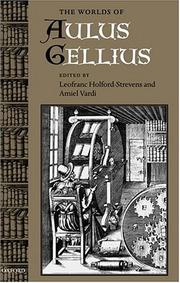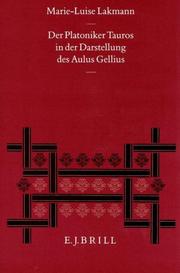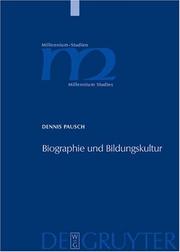| Listing 1 - 6 of 6 |
Sort by
|
Book
ISBN: 0872910717 Year: 1975 Publisher: Lawrence Coronado press
Abstract | Keywords | Export | Availability | Bookmark
 Loading...
Loading...Choose an application
- Reference Manager
- EndNote
- RefWorks (Direct export to RefWorks)
Authors, Latin --- -Rome in literature --- Authors, Roman --- Latin authors --- Roman authors --- Biography --- Gellius, Aulus --- Avl Gelliĭ --- Gelliĭ, Avl --- Gellius, A. --- Aulu-Gelle --- Gelle, Aulu --- Gellio, Aulo --- Gelyus, Olus --- Gelyus, Ulus --- Gelio, Aulo --- גליוס, אולוס --- Gelius, Aulus --- Rome in literature. --- Biography. --- Gellius, Aulus. --- Gelius, Aulius --- Rome --- In literature. --- Gelli, Auli
Book
ISBN: 9789004169869 9004169865 9786612399695 1282399691 904744342X 9789047443421 9781282399693 6612399694 Year: 2009 Volume: 297 Publisher: Leiden Boston
Abstract | Keywords | Export | Availability | Bookmark
 Loading...
Loading...Choose an application
- Reference Manager
- EndNote
- RefWorks (Direct export to RefWorks)
This monograph presents an original portrait of the second-century miscellanist Aulus Gellius, based on a detailed reading of Attic Nights against its contemporary background. Highlighting Gellius’ use of humour and irony in his portrayals of controversial celebrities such as Favorinus and Herodes Atticus, the book provides a necessary corrective to interpretations of Gellius as an uncritical philhellene or an apolitical bookworm. Distinguishing Gellius’ various literary personae (the youthful sectator, the independent researcher, the mature writer and adviser), the book uncovers the many-layered sophistication of Gellius’ self-presentation. Noting previously unrecognised allusions to literary works and contemporary events, it offers a fresh perspective on Gellius as a satirical writer, whose Roman cultural programme reflects the ambiguities and complexities of Antonine intellectual life.
Satire, Latin --- Satire latine --- History and criticism --- Histoire et critique --- Gellius, Aulus. --- Rome --- Rome dans la littérature --- In literature. --- Gellius, Aulus --- Criticism and interpretation --- In literature --- Criticism and interpretation. --- Rome dans la littérature --- Aulu-Gelle --- Gelio, Aulo --- Gelius, Aulius --- Gelli, Auli --- Avl Gelliĭ --- Gelliĭ, Avl --- Gellius, A. --- Gelle, Aulu --- Gellio, Aulo --- Gelyus, Olus --- Gelyus, Ulus --- גליוס, אולוס --- Gelius, Aulus --- Gellius, Aulus. - Noctes Atticae --- Gellius, Aulus - Criticism and interpretation --- Rome - In literature
Book
ISBN: 3515031707 9783515031707 Year: 1979 Volume: 1979/8 Publisher: Wiesbaden Steiner
Abstract | Keywords | Export | Availability | Bookmark
 Loading...
Loading...Choose an application
- Reference Manager
- EndNote
- RefWorks (Direct export to RefWorks)
Gellius, Aulus --- Apuleius --- Authorship --- -Apulien --- Apulée --- Apuleius Madaurensis --- Appuleius, Lucius --- Apuleius, Lucius --- Apuleio --- Apuleyo, Lucio --- Abūliyūs, Lūkiyūs --- Apuleius, --- Apuleius Platonicus Madaurensis --- Apuleu --- אפוליאוס --- לוקיוס, אפוליאוס --- ابوليوس --- Appuleius, --- Avl Gelliĭ --- Gelliĭ, Avl --- Gellius, A. --- Aulu-Gelle --- Gelle, Aulu --- Gellio, Aulo --- Gelyus, Olus --- Gelyus, Ulus --- Gelio, Aulo --- גליוס, אולוס --- Gelius, Aulus --- Gellius, Aulus. --- Authorship. --- -Authorship --- -Aulu-Gelle --- Gelius, Aulius --- Apulien --- Apuleius Barbarus --- Apulejus, Lucius --- Lucio Apuleio --- Apuleyo de Madauros --- Appuleius --- Gellius, Aulus - Noctes Atticae --- Apuleius - Authorship

ISBN: 0199264821 9780199264827 0191718408 9786611198251 0191532665 1281198250 1435622308 Year: 2004 Publisher: Oxford [etc.] : Oxford University Press,
Abstract | Keywords | Export | Availability | Bookmark
 Loading...
Loading...Choose an application
- Reference Manager
- EndNote
- RefWorks (Direct export to RefWorks)
"Aulus Gellius originated the modern use of 'classical' and 'humanities.' This study examines his life and writings" --Provided by publisher.
Authors, Latin --- Rome --- In literature --- Rome -- Dans la littérature --- Rome -- In de literatuur --- Rome -- In literature --- Rome dans la littérature --- Rome in de literatuur --- Rome in literature --- Gellius, Aulus --- Gellius, Aulus. --- Aulu-Gelle --- Gelio, Aulo --- Gelius, Aulius --- In literature. --- Rome dans la littérature --- Authors [Latin ] --- Biography --- Gelli, Auli --- Avl Gelliĭ --- Gelliĭ, Avl --- Gellius, A. --- Gelle, Aulu --- Gellio, Aulo --- Gelyus, Olus --- Gelyus, Ulus --- גליוס, אולוס --- Gelius, Aulus --- Authors, Latin - Biography --- Rome - In literature

ISBN: 9004100962 9004320857 9789004100961 Year: 1995 Volume: 63 Publisher: Leiden : E.J. Brill,
Abstract | Keywords | Export | Availability | Bookmark
 Loading...
Loading...Choose an application
- Reference Manager
- EndNote
- RefWorks (Direct export to RefWorks)
Aulus Gellius' accounts of his studies in Athens are a major source for the personality of Taurus the Platonic philosopher of the 2nd century A.D. and besides, give important insights into the history of Platonic school of that time. The present work puts together Gellius' reports on the Middle Platonist for the first time and — by its detailed commentary — offers a new understanding of contents, form and methods of his philosophical instructions, of the relationship between teacher and students, and of student life in the 2nd century A.D. in general. By this means numerous topics in ancient philosophy, philology, science, and pedagogics are dealt with. Finally the results thus gained are combined with all remaining literary and epigraphic evidence, so that a lively portrait of Taurus as a philosophical teacher emerges. A collection of testimonies and fragments concerning Taurus' life and work, a comprehensive bibliography, and indices complete the work.
Platonists --- Platoniciens --- Tauros, --- Gellius, Aulus. --- -Platonism --- Philosophers --- Philosophy, Ancient --- Tauros --- Gellius, Aulus --- Avl Gelliĭ --- Gelliĭ, Avl --- Gellius, A. --- Aulu-Gelle --- Gelle, Aulu --- Gellio, Aulo --- Gelyus, Olus --- Gelyus, Ulus --- Gelio, Aulo --- גליוס, אולוס --- Gelius, Aulus --- -Tauros --- Gelius, Aulius --- Platonism --- Taurus, --- Taurus Berytius, --- Taurus, Lucius Calvenus, --- Taurus, Calvisius, --- Greece --- Platonists. --- Noctes Atticae (Gellius, Aulus) --- A. Gellii Noctium Atticarum libri XX (Gellius, Aulus) --- Noctium Atticarum libri XX (Gellius, Aulus) --- Auli Gellii, luculentissimi scriptoris, Noctes Atticae (Gellius, Aulus) --- Auli Gellii Noctes Atticae (Gellius, Aulus) --- Greece. --- al-Yūnān --- Ancient Greece --- Ellada --- Ellas --- Ellēnikē Dēmokratia --- Elliniki Dimokratia --- Grčija --- Grèce --- Grecia --- Gret͡sii͡ --- Griechenland --- Hellada --- Hellas --- Hellenic Republic --- Hellēnikē Dēmokratia --- Kingdom of Greece --- République hellénique --- Royaume de Grèce --- Vasileion tēs Hellados --- Xila --- Yaṿan --- Yūnān --- Platonists - Greece.

ISBN: 3110182475 3110919842 Year: 2012 Volume: 4 Publisher: Berlin/Boston De Gruyter
Abstract | Keywords | Export | Availability | Bookmark
 Loading...
Loading...Choose an application
- Reference Manager
- EndNote
- RefWorks (Direct export to RefWorks)
Welche Bedeutung kam dem biographischen Wissenssegment im Kontext der Bildungskultur des 2. Jh. n. Chr. zu? Welche Formen wurden von zeitgenössischen Autoren zur literarischen Präsentation von Personen gewählt? Unter dieser doppelten Leitfrage werden hier Personendarstellungen in den Briefen des jüngeren Plinius, dem Miszellanwerk des Gellius und den Kaiserbiographien Suetons in einer gattungsübergreifend angelegten Perspektive untersucht. Zu den Gemeinsamkeiten, die sich auf diese Weise beobachten lassen, gehören das normative Potential historischer Figuren, die Kommemoration von Zeitgenossen und die Interaktion mit den kommunikativen Rahmenbedingungen der römischen Kaiserzeit. Eine solche funktionsgeschichtliche Betrachtungsweise zeigt ferner, dass es sich bei vielen der Charakteristika der untersuchten Autoren, die bislang als Abweichungen von der jeweiligen Gattungstradition kritisiert wurden, um bewusste Entwicklungen handelt, die eng auf ihren gemeinsamen gesellschaftlichen und kulturellen Kontext bezogen sind. What role did biographies play for the intelligentsia of the 2nd century AD? What literary forms were used by contemporary authors in their personal portrayals? These two questions have led to this cross-genre investigation of the personal portraits in the letters of Pliny the Younger, in the miscellaneous work of Gellius, and in the Lives of the Caesars by Suetonius. Among the common features which can thus be observed are the normative potential of historical figures, the commemoration of contemporaries, and the interaction with communicative conditions of the Roman Empire. Such a functional and historical perspective further demonstrates that many of the characteristics of the featured authors, which to date have been seen as deviations from the genre tradition, are, in actuality, conscious developments, closely related to the authors' common social and cultural background.
Pliny, --- Suetonius, --- Gellius, Aulus. --- Aulu-Gelle --- Gelio, Aulo --- Gelius, Aulius --- K. Svetoniĭ Trankvill, --- Sueton, --- Suétone, --- Suetone Tranquile, --- Suetonius Tranquillus, C. --- Suetonius Tranquillus, C., --- Suetonius Tranquillus, Gaius, --- Sveton, --- Svetonio, --- Svetonio Tranquillo, Gaio, --- Tranquillus, Gaius Suetonius, --- Светоний, --- סוטוניוס --- Caius Plinius, --- Gaĭ T︠S︡et︠s︡iliĭ Pliniĭ Sekund, --- Gaj Plinije, --- Kaĭ Pliniĭ T︠S︡et︠s︡iliĭ Vtoroĭ --- Pline, --- Pliniĭ, --- Plinio, --- Plinius Caecilius Secundus, C. --- Plinius Caecilius Secundus, Caius --- Plinius, Caius, --- Rome --- Rim --- Roman Empire --- Roman Republic (510-30 B.C.) --- Romi (Empire) --- Byzantine Empire --- Rome (Italy) --- Biography --- History and criticism. --- Civilization. --- Gelli, Auli --- Avl Gelliĭ --- Gelliĭ, Avl --- Gellius, A. --- Gelle, Aulu --- Gellio, Aulo --- Gelyus, Olus --- Gelyus, Ulus --- גליוס, אולוס --- Gelius, Aulus --- Gaius Plinius Secundus Minor --- C. Plini Caecili Secundi --- Pline le Jeune --- Plinius de jongere --- Plinius der Jüngere --- Plinius Caecilius Secundus, Gaius --- Bildungsideal. --- Kulturelle Kommunikation. --- Oberschicht. --- Römische Kaiserzeit. --- Römisches Reich. --- HISTORY / Ancient / General. --- Suetonius Tranquillus, Caius --- Suétone --- Suetonio --- Suetonius --- Pliny the Younger --- Gellius --- Lives of the Caesars --- Suetoniu --- 2nd century AD --- intelligentsia --- biographies
| Listing 1 - 6 of 6 |
Sort by
|

 Search
Search Feedback
Feedback About UniCat
About UniCat  Help
Help News
News